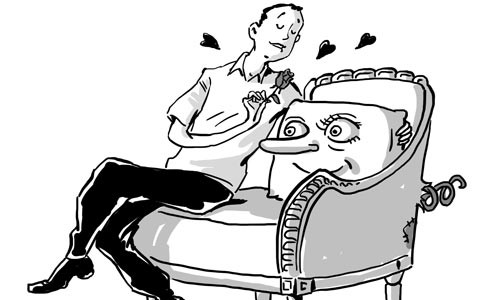Shoppers still easily fall for 'foreign' packaging
- By Wu Guangqiang
 0 Comment(s)
0 Comment(s) Print
Print E-mail
Global Times, July 15, 2011
E-mail
Global Times, July 15, 2011

When China was barely able to produce anything more than some daily necessities, owning an imported product, such as a packet of Marlboros or a Sanyo tape recorder, was a symbol of fashion and status for many.
Since the 1980s, China has been flooded with foreign brands from Nike to Panasonic. Today, almost all big global brands are available here.
But people will still spend tons more money just to get the feel of superiority in purchasing items marked with Roman letters. And some Chinese manufacturers have been taking advantage of this.
On July 10, CCTV's Weekly Quality Report, a popular program working to blow the lid off fake or shoddy consumer products, blew the whistle on the Da Vinci Home Corporation, one of the high tier brands in the Chinese mainland. Looking at those luxury items, it's hard for consumers not to be tempted to get a piece at any cost. But the cost must be beyond most buyers' reach.
Da Vinci charges 100,000 yuan ($15,460) for a single bed, and over 300,000 yuan for a set of sofa. A lady in Beijing spent 2.8 million yuan ($432,880) at one stroke on more than 40 pieces of furniture from a Da Vinci store in Beijing.
Like many Chinese upstarts, the lady, identified as a Mrs Tang, spent freely on her furniture because she thought only expensive foreign goods could show off her status properly. The silver-tongued salespersons talked her into believing that every piece they sold was an "international super brand," made in Italy, using "top-class, natural, and non-contaminated" material.
To Tang's dismay and horror, no sooner had the costly items been moved into her house than she was greeted by a pungent smell coming from the furniture. And the measurement of her 100,000 yuan single bed was not the same as she had ordered. Angry, she began to wonder just how "international" Da Vinci really was.
As reporters later discovered after a half-year long covert investigation, at least parts of the so-called Italian furniture were made in Dongguan, Guangdong - one of China's major furniture manufacturing bases.
On July 11, during a raid inspection of a Da Vinci outlet by Shanghai authorities, inspectors found toxic melamine and low-quality plywood were used instead of the solid wood that the salespeople had bragged of. That's why Tang was almost overwhelmed by a choking odor.
Though the owners of Da Vinci, which owns a chain of sub-brands all claiming to be of foreign origin, held a press meeting Wednesday and insisted that all their Italian products are out-and-out Italian, they've produced little evidence.
Nobody will be that surprised if Da Vinci turns out to be a lemon. We have had a spate of such cases before, such as SUNWOODS, a self-proclaimed "Danish" brand of hi-fi equipment, and Order flooring, a nonexistent "German" brand, just to name a couple. Digging deeper, we can find more fake "foreign" brands.
People who can afford more expensive goods have their reasons for putting their faith in foreign brands. How many internationally famous Chinese brands are there? Few, if any.
But do people who fervently pursue "foreign" brands really know what they are buying? Do they really have the ability to appreciate the quality and design of the products? Or do they simply make the purchase because the items are "made-in-Italy" or because they cost a fortune?
Chinese goods have made tremendous progress in quality. I used a TCL computer and am now using a Haier. Both of them operate without a hitch.
If customers want to buy something that they need instead of something they can show off, they'd be better off with reputable domestic brands. If they're cheated, it's because of their own gullibility when it comes to "foreign" goods.
The author is an English tutor and freelancer in Shenzhen.






Go to Forum >>0 Comment(s)